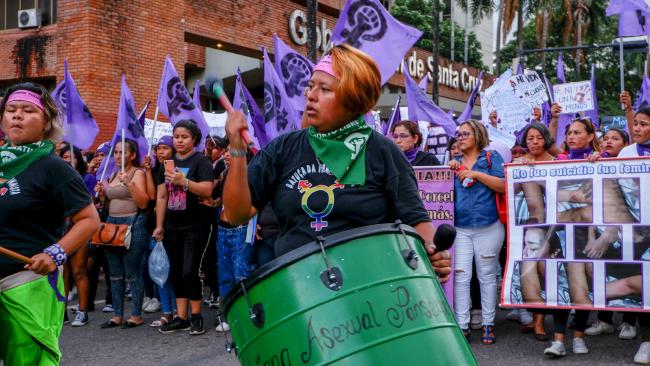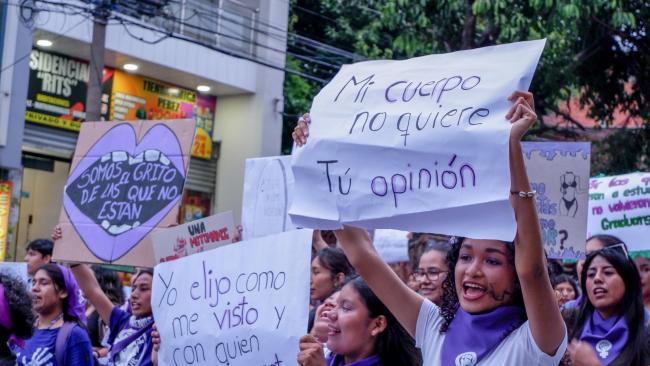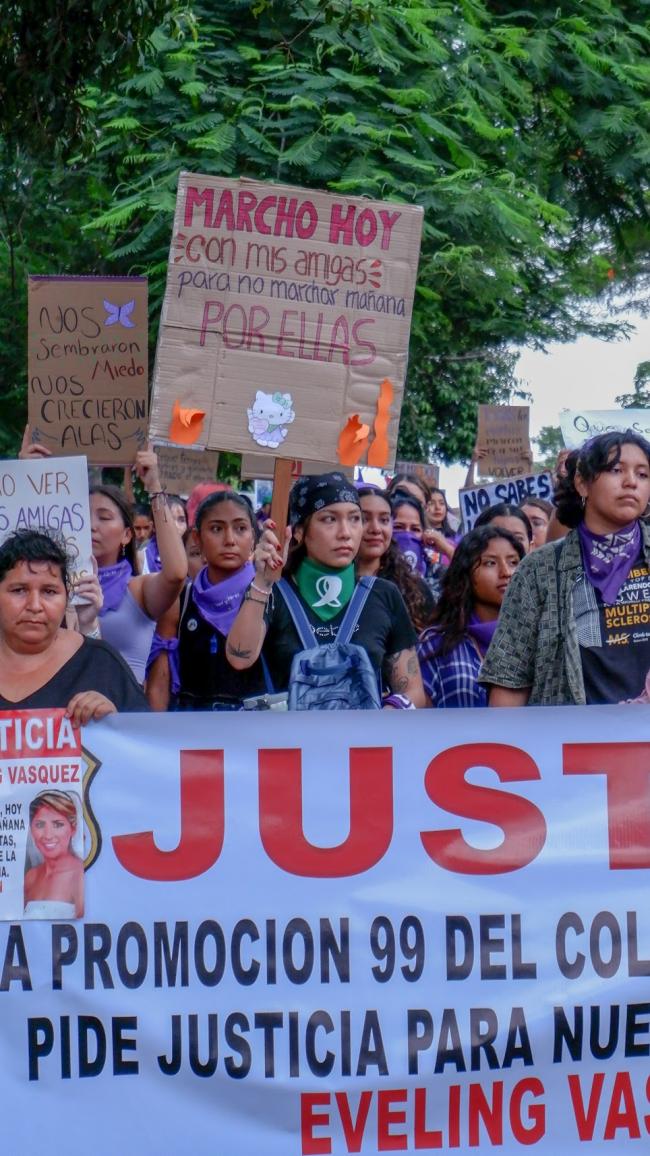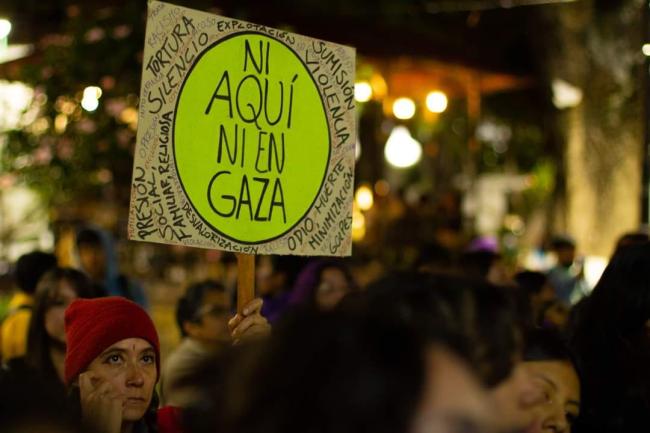
Leer este artículo en español.
This article was collectively written and originally published in Spanish by Bolivian Feminist Journalist Network (RedFem).
A green and purple tide swept through Bolivia on March 8, International Women's Day. Thousands of women united their voices shouting in the streets of different capital cities before a population divided between spectators and those who sought to disqualify them by calling them "locas" (crazies).
The force of young women was overwhelming in a country where eight out of 10 women have suffered an act of violence at some time in their lives, and where more than 1,000 femicides have been recorded since 2013.
“Fui la niña que tocaron sin su consentimiento, pero ahora soy la hermana mayor de la niña que jamás vas a tocar" (I was the girl they put their hands on without her consent, now I am the older sister of the girl you will never touch) was one of the chants raised against this violence. Others were directed at both the state and society such as: “¡Loca peleando! ¡Sumisa ni cagando!” (Fighting like crazy! Submissive, not a chance!) or “Te cansas de oírlo, nosotras de vivirlo” (You get tired of hearing about it, we get tired of living it).
In Santa Cruz
The march for 8M in the city of Santa Cruz de la Sierra, the most populous Bolivian city, was massive: more than six blocks of women marched to the rhythm of the feminist drumline. The most outstanding feature was the gathering of mainly young women, teenage faces together with their mothers and university students.
The march departed from the governor's office of Santa Cruz, protesting against violence and impunity. As on previous occasions on this date, there was no police protection for the marchers, who suffered insults and attempts to run them over by public transport buses and private vehicles. However, a contingent of police—most of them women—was sent to guard the Courthouse.

The pronouncement read at the end invoked the 12 victims of feminicide recorded in Bolivia this year, and slammed the justice system that fails to enforce convictions and is plagued by allegations of corruption. In the midst of rain, demonstrators pleaded for the Palestinian women who suffer most from Israeli attacks: almost 70 percent of the dead registered so far are women and children.
On a negative note: the politicization on the part of officials of the Governor's Office of Santa Cruz who, earlier in the morning, called for a parallel march, attended mainly by female civil servants. In addition, religious groups called for mobilizations "for life and the natural family" and implored citizens "to protect religious monuments such as the Cathedral."
"¿Para qué quieren los monumentos limpios en un país lleno de sangre de mujeres? (Why do they want clean monuments in a country soaked in the blood of women?)" responded the sign of one of the feminist marchers.
From El Alto to La Paz
In the department of La Paz, separate calls for mobilization in the neighboring cities of El Alto and La Paz were finally united to form a single demonstration.
The Articulación de Mujeres y Feministas Pluridiversas de La Paz y El Alto, the march organizer, was at the gates of the Court of Justice of this jurisdiction, where they protested against the irregularities of the justice system on issues of violence against women, with traditional wind instruments in the background.
With shouts of "Señor, señora, no sea indiferente, se mata a las mujeres en la cara de la gente" (Sir, madam, don't be indifferent, women are being killed in the face of the people), the participants got the attention of the population. They hope to initiate actions in El Alto in the following years and later merge efforts with activists in La Paz.
Approximately one hundred women set off from this point to the Juana Azurduy square, in the Villa Dolores area of the city, for an event with music, statements readings, and a collective reflection among the attendees on feminism in this city.
"Exigimos nuestra autonomía económica y estabilidad de precios" (We demand our economic autonomy and price stability), declared one of the speakers at the end. "Somos mujeres trabajadoras y denunciamos que las políticas del país no consideran nuestra voz" (We are working women and we denounce that the policies of the country do not consider our voices), said the same speaker wearing a green sweatshirt, which together with the color purple are characteristic of this day of vindication. After this intervention, they marched down Avenida Naciones Unidas singing and chanting slogans.

In La Paz
"Basta ya de minutos de miedo, tenemos derecho a que todos los minutos sean de libertad" (Enough fear, we have the right for every moment to be one of freedom), declared a sign with white letters and a black background held by Raquel and her classmates from the San Simón de Ayacucho school. At 11:30 am, the demonstrators' slogans and shouts rocked the Plaza Murillo in La Paz, the center of political power as the seat of government. For a moment, all eyes and cell phone cameras were focused on them before the crowd was surprised by rainfall.
Despite it being a cloudy March 8, Raquel's skin glowed and her eyes glazed over, on the verge of tears, as she talked about her best friend who was drugged and abused. "My motivation is to wake up and walk in a world without violence, without fear that we will not return home," the teenager concluded as the rain drove the crowds away.
One kilometer down the road at the well-known El Prado fountain, the clock struck 12:07 pm. Sheets of tin, bricks, and other debris were strewn purposely over the body of a woman holding a sign with the Palestinian flag: “30,100 dead, 8,800 women and 13,230 children,” it read. It was a silent scene, with no shouting in between, and the silence gathered peoples’ somber attention.
7:00 p.m. at the door of the Ministry of Justice in La Paz: A mother on her knees, her traditional skirt spread around her on the ground, begs for justice for her daughter who was murdered by her partner. The woman is accompanied by a girl; they overflow with tears and behind them an army of women cry out: “Justice!”
A few meters down the street, a group of clergymen guard the María Auxiliadora church, covered with blue plastic sheeting and metal wiring. Prayers and the national anthem are their means of defense that do not succeed in scaring away hundreds of women furious about the femicides and rapes of thousands of women around the world.
In Cochabamba
The concentration in the central city of Cochabamba gradually gathered force. At 4:00 pm in Plaza Sucre, dozens of diverse groups are already present. The march soon begins, and scarves, colors, and paintings surround necks, arms, faces, and eyes full of hope. Meanwhile, demonstrators’ signs harbor stories and feelings: "Si no hay paz para las víctimas, no habrá paz para los agresores" (If there is no peace for the victims, there will be no peace for the aggressors). "Olivia, hoy tu tía marcha por ti " (Olivia, today your aunt is marching for you). "No estamos todas, nos faltan las asesinadas" (We are not all here, we are missing the women murdered).
The march advances steadily with various organizations, individuals, and social sectors. Hope, rage, and strength fill the streets in the center of the city. The different blocs shout out: “Por nuestras muertas, ni un minuto de silencio, toda una vida de lucha" (For our dead, not a minute of silence, a lifetime of struggle), among other slogans and demands.
"It is the first time I am participating here in Cochabamba and it has been massive," observes Milenka López, an activist participating in the Palestine bloc. "Unfortunately, this year we find ourselves in the streets protesting against one of the greatest genocides and feminicides of the 21st century,” Milenka adds, “against Palestinian and also Syrian women."

Feelings transmute at each stop, with every intervention. Passing through the streets of Aroma until arriving at the main square, everyone shouts with hoarse voices that do not stop demanding justice.
"When I scream, I want to cry because it's like I'm doing something, I'm trying to make change," says Damaris López with a shaky voice.
The turnout is impressive; there is no longer talk of a green and purple tide, now it is a tsunami. Everything ends around 8:00 pm, amid hugs, tears, music, and dancing.
In Sucre
A girl holds up a sign: "¿Y la de pagar la pensión a tus hijos te la sabes?" (Do you know about paying for child support?) She has come to the 8M march with her mother, like several others accompanying a predominantly youthful mobilization for International Women's Day in Sucre, the conservative seat of the judiciary and official capital of Bolivia.
This is the fourth year with a massive convocation, while before the participants could easily be counted. Now there are more than five collectives present, two made up of artists, some independent organizations, and others of women—all organized to stop traffic as their march continues on. "Usted pierde un minuto pero nosotras la vida" (You lose a minute, but we lose our lives), reads another sign, and there is no lack of verbal aggression from some drivers.
People who do not participate observe. There are respectful, curious, indifferent, and many mocking looks. This year, this last attitude is not the common denominator among the police who guard the Prosecutor's Office, police station, San Francisco Xavier University, and Cathedral. Their calm helps to not exacerbate the already heated tempers by recalling revictimization, neglect, harassment, abuse, and pedophilia.
Protesters also shouted against this year’s violence at Carnaval. At the recent celebrations, a young mother was brought to intensive care after being hit in the back of the head with a balloon. "Basta de manosearnos y violentarnos con el pretexto del juego con agua" (Enough of groping and violence with the excuse of playing with water), they shout into the microphone.
A bridal train is left in the street of the safeguarded Cathedral. Written on it are the names of the women who have been killed. Beside it lies a doll of the rapist priest Alfonso "Pica" Pedrajas (a serial child molester who documented his crimes in his personal diary). The march closes with a recommendation: "No se vayan solas, entre todas nos cuidamos" (Don't go home alone, we must look out for each other).
In Tarija
Rage, helplessness, and melancholy were expressed at the marches that took place in Tarija, in southern Bolivia.
Rage against institutions such as the Governor's Office, which has in its hands the possibility of passing laws and allocating resources for the prevention of violence, and enacting policies that guarantee gender equity and the protection of women. But they do not do so under the argument of insufficient budgets.
Helplessness due to the indifference of the authorities, who from their balcony seats can see that Tarija has the highest rates of family violence, according to data from the Public Prosecutor's Office.
Melancholy for the women who died at the hands of feminicide, women who were failed by society and the system.
For them, for their families and for their children, hundreds of women took over the streets. With green and purple scarves, hooded sweatshirts, women in dresses and others in Indigenous skirts, young and old, all united by a cause.
This article was translated from Spanish by NACLA.
The Bolivian Feminist Journalism Network (RedFem) is a collaboration between women journalists from different regions of Bolivia. RedFem seeks to impact traditional media newsrooms to build better professional practices that include a gender perspective in their daily coverage.

